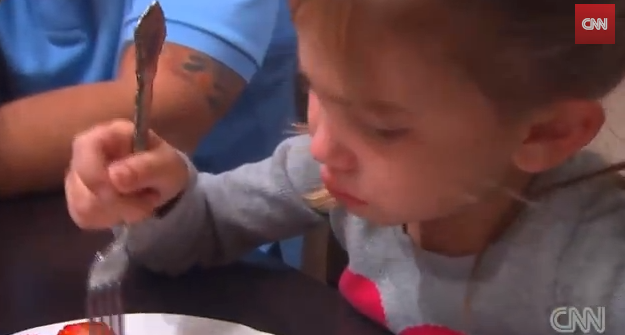Last month, CNN released a reporton picky eaters. This short piece featured the family of a picky pre-schooler, Harper O’Bamsawin. The brave O’Bamsawin family opened their house to the world, seeking solutions to improve their dinner table experience. The result, however, was an expose of common problems left unsolved.As the camera revealed a typical meal in Harper’s home, it quickly became clear that Harper’s parents have fallen into common behaviors that only breed picky eating. They unknowingly, unconsciously, struggle through a meal that would leave any parent sweaty with worried frustration. Regardless of any of the helpful tips offered by the physician that was interviewed throughout the segment, the visual images of the struggling O’Bamsawin family overshadowed any constructive advice.
It was simply painful to watch poor Harper choke down that piece of chicken. She nearly vomited.
In my opinion, the CNN journalist missed a great opportunity to highlight the behaviors of the O’Bamsawin family that were caught by the camera. Their dinner table experience is shared by so many other families struggling to get a child to eat. Practical solutions could have been offered by experts, allowing some intervention and providing help to the O’Bamsawins. Instead, the parents were left their shrugging their shoulders in perceived helplessness, and Harper was no closer to enjoying family dinner.
The good news is that for parents of even the pickiest of eaters, there is hope for change. New habits and attitudes can be added to the family table to limit the negative experience of the family meal, and encourage every child to eat independently to their own satisfaction.
If I could pull up a chair at the O’Bamsawin table...
I would ask everyone to put the same food on their plate. Everyone.
I would ask Dad to choose better words when he is talking to Harper about food. No begging, no justifying.
I would commend them for not having the TV on during dinner.
I would ask Dad to get his fork out of Harper’s mouth. She has the physical ability to feed herself.
I would want mom to let go of her guilt around mealtime. There is still time to change, improve, and grow.
I would tell Harper’s parents that gagging down an undesired food is not a success. She needs to increase her personal confidence and internal motivation to eat, not have the will to suppress a reflex.
I would let Harper serve herself, empowering her to choose what amount will be on her plate.
I would ask Mom to keep the yogurt in the fridge. She prepared a great meal for Harper. It was Harper’s choice to not eat it.
I would think of ways Harper can get involved in meal preparation. Make her proud to create new things to try.
I would ask Mom to not say aloud, “we don’t eat veggies.” In fact, I would challenge the family to open everyone to new food experiences with Harper. They can all learn new things together.
I would ask the parents to have trust in Harper’s body, and watch her growth with her pediatricians guidance.
And, most importantly, I would get comfortable with the wait.


